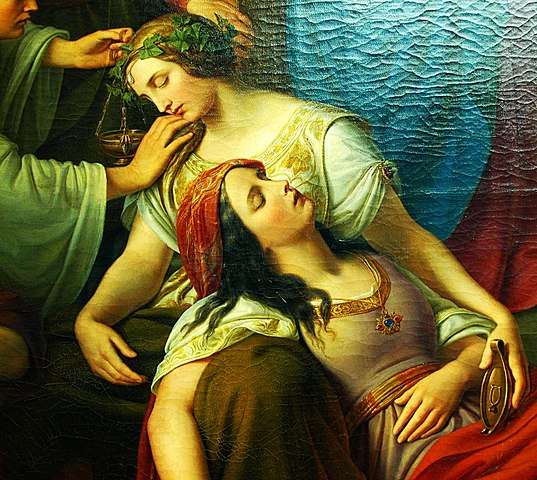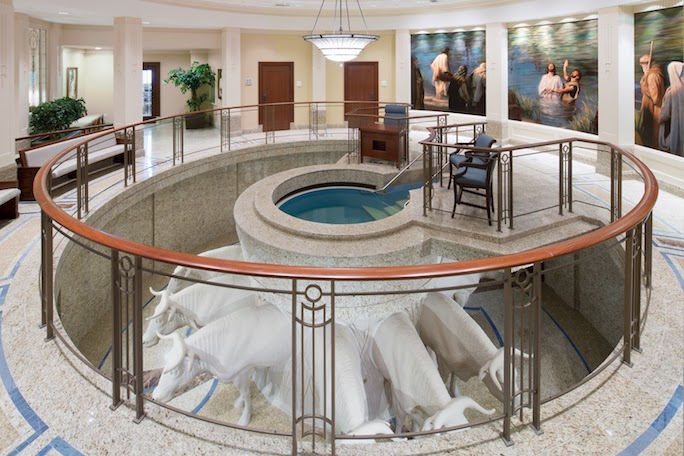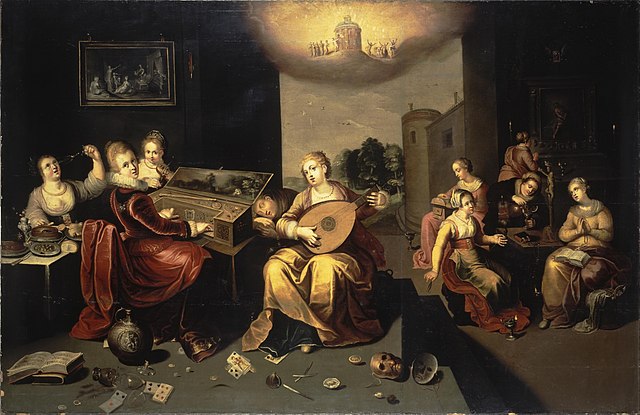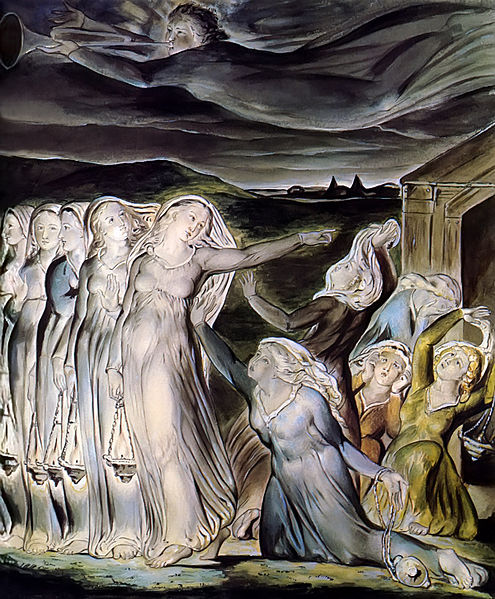There are few religious texts of greater interest to modern Christians than the apocalyptic writings of Matthew. And there are few passages more challenging than the eschatological parables in the 25th chapter of that gospel, the most familiar of which is the Parable of the Ten Bridesmaids (Matt. 25:1-13 NRSV):
1Then the kingdom of heaven will be like this. Ten bridesmaids took their lamps and went to meet the bridegroom. 2 Five of them were foolish, and five were wise. 3 When the foolish took their lamps, they took no oil with them; 4 but the wise took flasks of oil with their lamps. 5 As the bridegroom was delayed, all of them became drowsy and slept. 6 But at midnight there was a shout, ‘Look! Here is the bridegroom! Come out to meet him.’ 7 Then all those bridesmaids got up and trimmed their lamps. 8 The foolish said to the wise, ‘Give us some of your oil, for our lamps are going out.’ 9 But the wise replied, ‘No! there will not be enough for you and for us; you had better go to the dealers and buy some for yourselves.’ 10 And while they went to buy it, the bridegroom came, and those who were ready went with him into the wedding banquet; and the door was shut. 11 Later the other bridesmaids came also, saying, ‘Lord, lord, open to us.’ 12 But he replied, ‘Truly I tell you, I do not know you.’ 13 Keep awake therefore, for you know neither the day nor the hour.

Virtually every Christian denomination, including Mormonism, reduces the moral of this story to a few platitudes such as, “be prepared” and “stay alert” because you never know when the Lord will come again. As one scholar put it, this does little more than turn the five wise bridesmaids into Boy Scouts,[1] which begs the question: if that’s all there is to this story, why bother, especially since that message was already conveyed in Chapter 24 of Matthew?
Moreover, we unwittingly arrive at these simplistic conclusions by drawing inferences from the behavior of the characters that the text does not support. Worst of all, we fail to consider how modern-day revelation about the Plan of Salvation can inform our understanding of this parable.
The setting for this story is ten bridesmaids who have gone out in anticipation of accompanying the bridegroom when he returns with his fiancé after paying the bride-price to his in-laws. Once he has claimed his wife-to-be, they will retire to the home of his family for the wedding festivities, which, by tradition, take place at night, and will not begin until they arrive.
But there is no “they” here; no bride is ever mentioned. This omission ostensibly was done to allegorize the bridegroom as the Messiah, which would be in keeping with the theme of Matthew 24 and 25. This imagery would have resonated with Christ’s audience since it was frequently employed in the Old Testament to depict God as the groom and the people of Israel as the bride, with the Torah standing as the marriage covenant between Jehovah and his people.
Further, as noted by biblical scholar N. T. Wright, it would have underscored the fact that this parable isn’t just about the “end times.” “Throughout his ministry, Jesus was coming as the promised Messiah to his people.”[2] Once again, the Savior was extending an invitation to the Israelites to join the wedding feast.
Each bridesmaid has brought a lamp to use to help light the way for the wedding processional, but five, aka, the wise ones, carried some extra oil in case the groom was delayed. Sure enough, he is running late—so late, in fact that everyone dozes off.

Now, the scene has been set and the action begins to unfold.
A cry goes out: “The bridegroom is coming; let’s go meet him!” The bridesmaids all awaken, but those who didn’t bring extra oil discover that their lamps are going out. They ask to borrow some from their friends, who refuse to share because they fear running out themselves. The unwise bridesmaids are then advised to go to the market and buy some more. While their errand is successful, they do not return in time to participate in the procession and they are denied admission to the wedding feast.
The oil in this story is symbolic, we are told, of good deeds, righteous living, and/or testimony—commodities that are not shareable.[3] They are our celestial savings account—“go to church, get another drop of oil”[4]—with which we will purchase our ticket to the Kingdom of Heaven. But the text does not support this interpretation and our own teachings argue in favor of a different meaning.
The wise bridesmaids never said they couldn’t share or were incapable of doing so. Rather, they simply didn’t want to. Further, oil is not described as a passive commodity in the New Testament nor is it treated as something to be hoarded. Rather, it is employed in the service of others. Christ’s disciples used it when healing the sick and the Good Samaritan treated the wounds of the robbed traveler with oil. And, most poignant of all, is the anointing of the Savior’s feet by a sinful woman.[5]
But even if we do equate the oil in this parable with each individual’s personal reservoir of good deeds and spiritual strength, in a very real sense these can be shared. For example, those who have died without being baptized can nevertheless become eligible for admission to God’s kingdom if we perform that ordinance and keep that commandment on their behalf.

Our good deed becomes their good deed: they are credited with having been baptized because of what we did. Their spiritual strength has been potentially augmented. So has ours. All because we shared.
The parable is silent on the question of whether the prudent bridesmaids should have been generous with their oil. But in that silence we are left to wonder what was going through the minds of these “wise virgins” when they discovered that half their friends and family had been denied admission? How much joy did they truly derive from the celebration when they saw so many empty seats around the table?

Putting aside, for the moment, the question of whether the five wise ones acted properly when they elected not to share, there is no denying that their fellow bridesmaids were foolish. But not, I believe, for their failure to bring more oil. Perhaps they brought all they had. No, their fatal mistake was something altogether different: they left. They didn’t fully trust the love of the bridegroom for his friends and had forgotten the words of Isaiah:
Kings shall be your foster fathers, and their queens your nursing mothers. With their faces to the ground they shall bow down to you, and lick the dust of your feet. Then you will know that I am the LORD; those who wait for me shall not be put to shame.
Isaiah 49:23 (NRSV)
What would have happened if they had simply waited with their flickering and dying lamps? Might not the bridegroom’s disappointment at the condition of their lamps been outweighed by his joy in discovering that their faith was strong enough to sustain them in the darkness until he arrived? That they trusted him, that they didn’t abandon him?
A more accurate translation of the phrase “keep awake” in verse 13, I believe, is “be vigilant,” which means much more than simply not dozing off in church. It implies we should be attentive to what really matters, avoid distraction, and concentrate on the task at hand, which, in the case of all ten bridesmaids, was being present when the bridegroom arrived. What mattered most to the bridegroom was having his friends with him to celebrate this joyous occasion. The oil, by contrast, was a material thing in which he exhibited no interest upon his arrival.
In the final analysis, the salvation of each one of us depends upon the grace of God. He conveys this message in verse five—but we completely miss it—when he notes that all of the bridesmaids, including the wise ones, fell asleep while waiting for him. This is an obvious allusion to the disciples’ inability to “keep awake” in Gethsemane and to Christ’s atonement—his grace—without which all of our good works and oil reserves would be for naught.
The simple truth is that if the bridegroom had been late enough, every single bridesmaid would have burned through her oil. As noted by one biblical scholar, both the wise and the foolish were operating from “the same premise of scarcity and fear.”[6] They focussed on some oil needed to light a decorative lamp instead of celebrating the joyous union between the bridegroom (Jehovah) and his bride (Israel).
Sometimes we don’t feel worthy to be in his presence, to approach him in prayer, to come to church, to take the sacrament. And sometimes the “wise” in our midst make us feel uncomfortable because of the way we dress, the beliefs we hold, or the companions we choose. Tellingly, the wise bridesmaids seemed more concerned about the quality of the lighting during the wedding parade than they were about the welfare of their friends when they admonished them to leave and not come back without more oil.

Finally, I do not mean to suggest that our actions do not matter, that we will not be held accountable for the choices we have made. But after all of the apocalyptic declarations and words of warning in Matthew, we come to the final verses of chapter 25 where Jesus casts himself in the role of each of us in our moments of greatest weakness, when we are sick, spiritually or physically, when we are not welcomed by others, when we find ourselves imprisoned by our unrighteous actions. Since he requires each of us to treat those in such circumstances with love and compassion, I am hopeful he will do the same for me.
And if my lamp is flickering at the end, I shall look for solace to the words of Isaiah: “a bruised reed he will not break, and a dimly burning wick he will not extinguish; he will faithfully bring forth justice.” Isaiah 42:3 (NASB).
[1] Levine, Amy-Jill, Short Stories by Jesus, HarperCollins, 2014, p. 280.
[2] Wright, N.T., Matthew for Everyone: Part 2, Westminster John Knox Press, 2004, p. 134.
[3] Marvin J. Ashton, “A Time of Urgency,” General Conference, April 1974.
[4] Kimball, Spencer W., Faith Precedes the Miracle, Deseret Book Company, 1972, p. 256 “Attendance at sacrament meetings adds oil to our lamps, drop by drop over the years.”
[5] Luke 7:37-38.
[6] David Roberts, “The Breaking of the Bridesmaids: Rethinking a Problematic Parable,” Patheos, Nov. 3, 2014.

I really enjoyed reading your perspective on this allegory. I have never thought about it in this way before. My husband and I lived in the Arlington Ward 10 years ago but I am still on the listserve and started reading your emails and now your blog. I enjoy learning from your scriptural and historical knowledge. Katy Mitarai
I love this in depth study of the Parable of the Wise and Foolish Virgins! I have always been bothered that the wise virgins did not share of their oil with the foolish ones. There are so many facets of this parable that can be applied to mortal life and its varied circumstances for every soul that comes to earth. Remaining steadfast and immovable even though one’s lamp may be flickering is a comforting considering! Don’t leave- there will always be those amongst us with brighter lights – their light can help rekindle the lights in our own lamps. All kinds of ideas come to mind including D&C 46 – gifts of the spirit of which one is believing the testimonies of others; food storage – what to do if you have been faithful in storing provisions and your neighbor has not – do you share or send them to get for themselves? I believe we know what the Savior would want us to do! Who among us always has enough oil of their own in their lamps – Certainly the Savior does make up the difference – and standing together with other faithful believers strengthens our resolve as we all try to endure to the end!
Thanks Eric! This parable has always been a tough one for me – perhaps it highlights my fears of being unprepared or unprepared in comparison to others. But I appreciate the idea of hanging on, even with a flickering light, may be all that is required.
Thank you all for your kind words and additional insights, which always enrich my understanding of the things about which I write.
When I started to compose essays on the New Testament last year, I avoided this parable because I didn’t like the conventional interpretation, but an alternative one wasn’t obvious to me. A dear friend of mine in the ward pressed me to take it on anyway, and I’m glad I did, though it was one of the most difficult—but also satisfying—ones I’ve done.
If I’ve learned nothing myself in my study of the four gospels, it is this: a superficial reading of Christ’s teachings usually misses the mark. They invariably contain a provocation, something designed to make us feel uncomfortable and to question what we thought we knew. And I wouldn’t have it any other way.
I love your paragraph above: “If I’ve learned nothing myself….” I also firmly believe that teachings and scriptures I thought I thoroughly understood or those I thought I would never understand, can come alive though study, pondering, sharing, and personal insight. I also feel this way in the temple as I hear the same service over and over but almost always come away with new and different insights or just personal comfort. I always also had trouble about the 10 Virgins not sharing their oil. I can’t imagine not helping someone else in need when I had the ability to help. My bother Kelly who I often quote told me two things that have helped me understand the balance of Grace and Deeds. First he said we are like people in a pit. The Lord puts down a ladder but we have to reach up and take hold of it. Also he used to have his seminary students stand up and jump from a standing position. Next he had them bend their knees and push before take off. Obvious the difference in height is notable. I like seeing the virgin’s oil as a gloss over. The real issue is personal effort. You can stay or not stay. Or you can feel inadequate and turn away to another source of oil and, you can (as I most certainly would have done), fall prey to your human bodily weakness and go to sleep. What separated the 5 virgins who awoke and proceeded on was renewed effort probably possible because of a reservoir of built up strength or oil to draw upon even when the body had been weak. The other 5 felt they had to go back to replenish failing to recognize that if you reach out to Christ (the bridegroom) his love and power and overcome any weakness you may have. When he arrives it is never too late unless you are not there to welcome and believe in him.
That is well said, Karen. And I agree with your assessment of the oil as a “gloss over” in the parable. It plays a role, but not, in my opinion, the one typically given it by our church and many others.
Your brother, Kelly, sounds like a great guy with much to contribute. Thanks for sharing his and your thoughts and perspectives.
You would enjoy Kelly. You strike me as kindred spirits. He, like you, is a thinker and is always looking at different more accurate ways to see things. We’ll have to go to dinner together sometime after this pandemic is over.
Karen, I can think of nothing I would enjoy more.
This is still one of my favorites. I came back to it today for another read. Thank you!